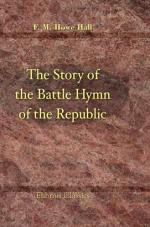|
This section contains 2,624 words (approx. 9 pages at 300 words per page) |

|
Born May 27, 1819
New York City, New York
Died October 17, 1910
Newport, Rhode Island
Writer and lecturer; activist for abolition, women's rights, and peace
 Julia Ward Howe. © Bettmann/Corbis.
Julia Ward Howe. © Bettmann/Corbis.
"The new domain now made clear to me was that of true womanhood—woman no longer in her ancillary relation to her opposite, man, but in her direct relation to the divine plan and purpose, as a free agent, fully sharing with man every human right and every human responsibility."
Julia Ward Howe is perhaps best known as the writer of "The Battle Hymn of the Republic" (1862), which became the unofficial song of the Union army during the American Civil War (1861–65). However, Howe was equally significant during her lifetime as an activist for abolition (ending slavery), women's rights, peace, and prison reform. She was a founding member of the American Woman Suffrage Association, a leading organization for...
|
This section contains 2,624 words (approx. 9 pages at 300 words per page) |

|


